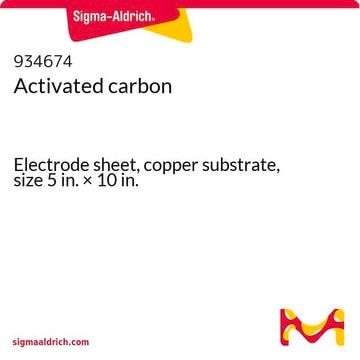05105
Activated charcoal
powder
Synonym(s):
Charcoal activated
About This Item
Recommended Products
vapor pressure
<0.1 mmHg ( 20 °C)
Quality Level
description
iodine-adsorption (0.05 mol I2/I) > 70 mL/g
methylene blue-adsorption > 12 mL/0.1 g 0.15% sol.
form
powder
autoignition temp.
842 °F
resistivity
1375 μΩ-cm, 20°C (graphite)
technique(s)
photometry: suitable
ign. residue
≤2%
mp
3550 °C (lit.)
anion traces
chloride (Cl-): ≤5000 mg/kg
sulfate (SO42-): ≤5000 mg/kg
cation traces
Ca: ≤1000 mg/kg
Cd: ≤10 mg/kg
Co: ≤10 mg/kg
Cr: ≤10 mg/kg
Cu: ≤10 mg/kg
Fe: ≤300 mg/kg
K: ≤200 mg/kg
Mg: ≤200 mg/kg
Mn: ≤50 mg/kg
Na: ≤500 mg/kg
Ni: ≤10 mg/kg
Pb: ≤10 mg/kg
Zn: ≤10 mg/kg
application(s)
food and beverages
general analytical
SMILES string
[C]
InChI
1S/C
InChI key
OKTJSMMVPCPJKN-UHFFFAOYSA-N
Looking for similar products? Visit Product Comparison Guide
General description
- Fiber coating to compare solid-phase microextraction efficiency of the multiwalled carbon nanotubes in water and milk samples before GC-ECD analysis.
- It may be used to study its effect on tissue cultures of Daucus carota, Happlopapus gracilis and Allum cepa var. proliferum, to check the adsorption of metabolites inhibiting morphognesis.
- It may also be used in the plant tissue culture to increase the adsorption of auxin and cytokinin from the culture media.
- It may also be used as the primary gastrointestinal decontamination procedure after acute drug overdose.
- It may also be used for the adsorption of dyes namely malachite green, bromophenol blue, alizarine red-S, methylene blue, eriochrome black-T, phenol red, methyl blue, and methyl violet from aqueous media.
- Oral activated charcoal may be also used for adsorption of theophylline, hence can be effectively used in patients with theophylline poisoning.
Storage Class Code
11 - Combustible Solids
WGK
WGK 3
Flash Point(F)
Not applicable
Flash Point(C)
Not applicable
Personal Protective Equipment
Choose from one of the most recent versions:
Already Own This Product?
Find documentation for the products that you have recently purchased in the Document Library.
Customers Also Viewed
Our team of scientists has experience in all areas of research including Life Science, Material Science, Chemical Synthesis, Chromatography, Analytical and many others.
Contact Technical Service






